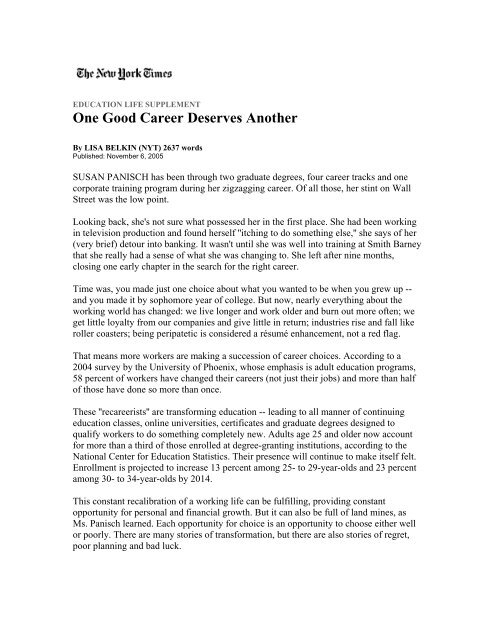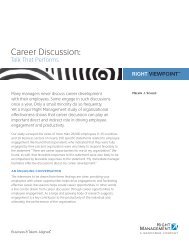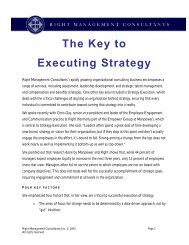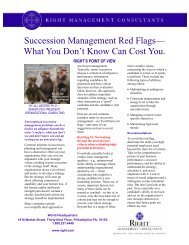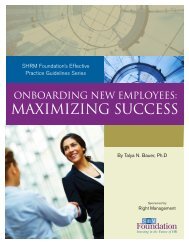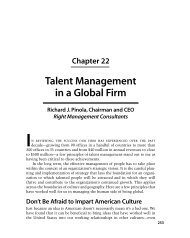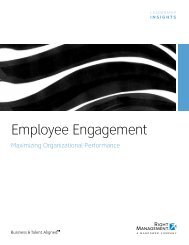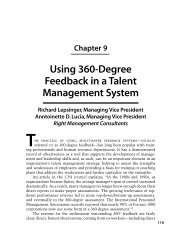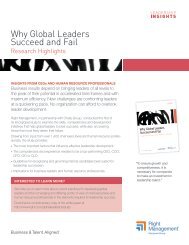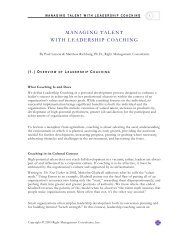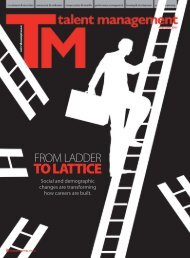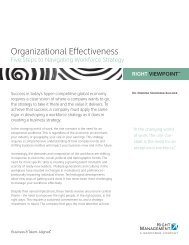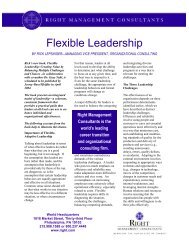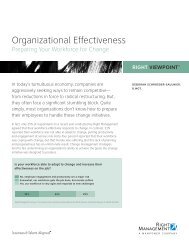One Good Career Deserves Another - Right Management
One Good Career Deserves Another - Right Management
One Good Career Deserves Another - Right Management
You also want an ePaper? Increase the reach of your titles
YUMPU automatically turns print PDFs into web optimized ePapers that Google loves.
EDUCATION LIFE SUPPLEMENT<br />
<strong>One</strong> <strong>Good</strong> <strong>Career</strong> <strong>Deserves</strong> <strong>Another</strong><br />
By LISA BELKIN (NYT) 2637 words<br />
Published: November 6, 2005<br />
SUSAN PANISCH has been through two graduate degrees, four career tracks and one<br />
corporate training program during her zigzagging career. Of all those, her stint on Wall<br />
Street was the low point.<br />
Looking back, she's not sure what possessed her in the first place. She had been working<br />
in television production and found herself ''itching to do something else,'' she says of her<br />
(very brief) detour into banking. It wasn't until she was well into training at Smith Barney<br />
that she really had a sense of what she was changing to. She left after nine months,<br />
closing one early chapter in the search for the right career.<br />
Time was, you made just one choice about what you wanted to be when you grew up --<br />
and you made it by sophomore year of college. But now, nearly everything about the<br />
working world has changed: we live longer and work older and burn out more often; we<br />
get little loyalty from our companies and give little in return; industries rise and fall like<br />
roller coasters; being peripatetic is considered a résumé enhancement, not a red flag.<br />
That means more workers are making a succession of career choices. According to a<br />
2004 survey by the University of Phoenix, whose emphasis is adult education programs,<br />
58 percent of workers have changed their careers (not just their jobs) and more than half<br />
of those have done so more than once.<br />
These ''recareerists'' are transforming education -- leading to all manner of continuing<br />
education classes, online universities, certificates and graduate degrees designed to<br />
qualify workers to do something completely new. Adults age 25 and older now account<br />
for more than a third of those enrolled at degree-granting institutions, according to the<br />
National Center for Education Statistics. Their presence will continue to make itself felt.<br />
Enrollment is projected to increase 13 percent among 25- to 29-year-olds and 23 percent<br />
among 30- to 34-year-olds by 2014.<br />
This constant recalibration of a working life can be fulfilling, providing constant<br />
opportunity for personal and financial growth. But it can also be full of land mines, as<br />
Ms. Panisch learned. Each opportunity for choice is an opportunity to choose either well<br />
or poorly. There are many stories of transformation, but there are also stories of regret,<br />
poor planning and bad luck.
Some educators warn that visions of a career transformation can be naïve. Doors close<br />
over time. Prospects are limited by lack of experience. ''The notion of the unbounded<br />
career,'' says Peter Cappelli, professor of management at the Wharton School at the<br />
University of Pennsylvania, ''is pure myth.''<br />
Anna Ivey, a career counselor who specializes in law and business school, advises her<br />
clients to talk to people already doing the job about the market and the downside --<br />
tedium, layoff rates, financial instability -- as well as the attractions.<br />
''You have to have positive and well-researched reasons for making the change,'' says Ms.<br />
Ivey. (She is a career changer herself, having been a lawyer and dean of admissions at the<br />
University of Chicago Law School; she didn't like the hours or inflexibility.) ''Make sure<br />
you are not just fleeing your old job,'' she says. ''It's very easy to romanticize other jobs<br />
and other careers if you're stewing away at your desk and plotting your escape.''<br />
It was that need to flee that led Ms. Panisch, now 50 and living in Connecticut, to take<br />
her early misstep. Sports television had been her goal since high school. With an<br />
undergraduate degree from Syracuse University and a master's in journalism from<br />
Northwestern, she spent a few years at a PBS station before finding herself at ABC<br />
Sports, producing at the Olympics, N.F.L. games and basketball tournaments. ''This was a<br />
dream come true for me,'' she says.<br />
At least it was at first.<br />
After a few years, ''my interests changed, they morphed,'' she says. ''There was constant<br />
travel, the atmosphere was pretty rowdy, there was no intellectual satisfaction for me, I<br />
didn't have a life. I didn't want to be 40 and still doing sports production in the back of a<br />
truck.''<br />
She tried to switch from television producing, which is about logistics and execution, to<br />
television programming, which is about development and deal-making. ''I interviewed for<br />
positions in programming but I couldn't get it,'' she says. ''People see you one way.''<br />
After nearly 10 years in the business, she was laid off and decided to try something<br />
completely different, at Smith Barney. ''I thought I knew what I was getting into, but I<br />
didn't really know a thing,'' she says. ''It was a lot of sales, a lot of cold calling. I don't<br />
think I am truly a salesperson.''<br />
Of course, it didn't help that she started on this new path the day before Black Tuesday in<br />
1987.<br />
Her decision to leave TV production was right, she sees with hindsight, but her<br />
impulsiveness was wrong. Experts agree, and a growing industry of consultants has<br />
sprung up to help with the planning and decisions. Robert DeLaney used such a service<br />
two years ago when he was thinking about becoming a teacher.
At the time he was a real estate broker in Boston. He had recently turned 50, and ''my<br />
best years as a broker were behind me,'' he says. ''I had accomplished what I wanted to in<br />
brokerage, found myself lacking in motivation, and you have to be motivated in that<br />
industry. It's a hustle. I needed to change, and I'm not good at change.''<br />
He signed on with New Directions, a Boston-based career counseling company at the<br />
expensive end of the spectrum, with rates starting at $30,000 and clients who are<br />
successful executives looking for a change. (Cheaper advice is available out there, from<br />
hundreds of dollars to a couple thousand, depending on services provided.) For that<br />
money, Mr. DeLaney spent three months ''looking under the hood to find out what I am<br />
really all about,'' he says.<br />
He met with a psychologist and took a battery of tests, including the Myers-Briggs, to<br />
evaluate his working personality type. A counselor interviewed Mr. DeLaney as well as<br />
people who knew different facets of him -- a former boss, a longtime secretary, a fellow<br />
volunteer at a charitable organization, a client. In the end, he was told he didn't believe<br />
strongly enough in his ability to be a good teacher, so he wouldn't be one, given his<br />
psychological makeup. (''I'd taught Sunday school,'' he says, ''and I was a pretty lousy<br />
teacher, to be honest.'')<br />
The analysis led, to his surprise, to a different part of real estate -- development. In that<br />
way he is typical of career changers. Most workers who set out to change their lives wind<br />
up in positions related to the ones they left, according to <strong>Right</strong> <strong>Management</strong> Consultants.<br />
In a survey of 5,600 displaced workers polled by the company last year, 56 percent said<br />
they wanted to do something significantly different with their lives. But of the 14,000<br />
people who landed new jobs in 2004 with the company's help, only 5 percent were in<br />
different careers.<br />
But just because Mr. DeLaney did not become a teacher does not mean he did not make a<br />
change. ''Brokerage means representing tenants, landlords, it's transactional, it's sales,''<br />
Mr. DeLaney says, ''while development means going out and opportunistically buying a<br />
building that's underutilized, having vision.''<br />
Doug Matthews, executive vice president of <strong>Right</strong> <strong>Management</strong>, says that such less<br />
drastic changes are more likely to work. Taking skills acquired in one industry and<br />
transferring them to another is ''the most common, and successful, type of career shift,''<br />
he says.<br />
Mr. DeLaney has just finished a master's program in real estate at the Massachusetts<br />
Institute of Technology, studying the theory and practice of environmentally responsible<br />
land development. He is starting his own business, building retail and housing space in<br />
the Southwest.<br />
Ms. Panisch did the same self-examination as Mr. DeLaney without paying a professional<br />
adviser. After fleeing her banking training program, she ''went straight back into
television production, because it's what I knew how to do,'' she says, determined that her<br />
next move would be more deliberate.<br />
She knew the goal -- a more professional, management-level, deal-making life. Over the<br />
next seven years, she paid close attention to the backgrounds of those who did that kind<br />
of work, and went on ''informational interviews,'' in which the stated goal was not to land<br />
a job but to get advice.<br />
Her conclusion was that she needed either a law degree or a business degree, and she<br />
found the former more appealing. She had just turned 37 when she entered the Benjamin<br />
N. Cardozo Law School at Yeshiva University, and by taking extra courses every<br />
semester, she finished in two and a half years.<br />
''I was older,'' she says of her rush to graduate. ''I wanted to make the pain level as low as<br />
possible.''<br />
Still, it was painful. Many older students report back that master's degree programs and<br />
professional schools are far more demanding than the undergraduate years of memory,<br />
and Ms. Panisch was exhausted.<br />
''There were times I would wake up so fatigued I couldn't put one foot in front of the<br />
other,'' she says. ''The volume of work was difficult. I had been out a long time, and I had<br />
to rethink studying again.''<br />
Mr. DeLaney agrees. ''The first semester was very difficult,'' he recalls. ''You had to dig<br />
in and do the reading, do the work. The energy level of youth is impressive. I was the<br />
tortoise among the hares. I did my reading, I did my homework. I wasn't off drinking at<br />
night with a bunch of 30-year-olds. I have three kids. I was home asleep.''<br />
Most adult students have to juggle work and school. That approach brings one form of<br />
stress. The alternative brings another. Because Ms. Panisch quit work and went to law<br />
school full time, she financed nearly all of her education with loans, emerging from law<br />
school deeply in debt.<br />
Ms. Panisch did think she would enter the world of law when she graduated, and even<br />
prepared for it by working for a judge and clerking at a law firm while in school. But<br />
even the most careful consideration does not mean the road into a new life will be linear.<br />
The realization slowly dawned that the law was not for her, at least not by that point in<br />
her life.<br />
''I saw that it was going to be very hard at my age to get a job in a law firm,'' she says.<br />
''And I also started coming to terms with the type of person I am. I'm entrepreneurial,<br />
free-floating. Having to calculate billing every half-hour, or be confrontational and<br />
adversarial, that just wasn't for me.'' Her conclusion was: ''I really just need to go back<br />
into what I loved, television.'' Though she was still not trained in programming, she now
had an extra wallop on her résumé in the form of a law degree. On the other hand, she<br />
also had dues to pay (not to mention mounting debts from loans).<br />
So she spent the next year or two working three jobs: one -- a weekend job doing<br />
television production -- was familiar. The second -- legal auditing -- paid some bills. The<br />
third -- as a freelance consultant in programming to the new Outdoor Life Network, a<br />
cable channel based in Stamford, Conn. -- was the least remunerative. But it got her foot<br />
in the door.<br />
''You have to be willing to start at the bottom of the totem pole,'' she says. ''That's hard.''<br />
Alfrieda Sparks, who is in her late 40's, is learning just how hard. For decades she was a<br />
flight attendant, first for T.W.A., then for American. In 1986, an airline strike spurred her<br />
to enroll at Queens College, part of the City University of New York, to get her college<br />
degree. She chose accounting as a major because she enjoyed keeping her checkbook<br />
balanced. She had no need to use that degree, however, until 2003, when she was laid off<br />
from her job in an ailing industry.<br />
Her first instinct was to look for another airline job. After months of futile effort, Ms.<br />
Sparks brushed up on accounting courses, took the C.P.A. exam and set out to find a job<br />
as an accountant. She didn't even send résumés to the large accounting firms, assuming<br />
they would not want to hire an older woman with no experience in the field. She sent a<br />
résumé to the Internal Revenue Service, and never received a response, and to some small<br />
firms, which did not answer her, either.<br />
She went to job fair after job fair, and eventually met a recruiter with the accounting firm<br />
Grant Thornton, which accepted her into its training program. She was offered the<br />
position last fall, but did not begin working at the firm until this September because the<br />
rest of the trainees were June college graduates.<br />
''I think they looked at me as being their mother,'' she says of the initial reaction of her<br />
new colleagues. ''Yes, I'm the same entry level as kids out of college. I'm not letting it<br />
bother me. I'm just happy to be here.''<br />
If the bottom rung is a necessary start for recareerists, the trip up the ladder can be faster<br />
the second time around. Susan Panisch is an example of that. Her gamble with the<br />
Outdoor Life Network paid off, literally, in that she erased her law school debt in three<br />
years. It also paid off in other ways, leading to a full-time job and then to her current<br />
position as the network's vice president for original programming, which, she says, is<br />
exactly the kind of work that she wanted in the beginning.<br />
''The road back out of law school was not easy for me,'' Ms. Panisch recalls. ''I do see the<br />
results now, but you have to be patient. <strong>One</strong> thing my education did for me was enable<br />
people to see me differently. People look at you as one thing; it's pretty hard to change<br />
how they see. I had to totally retool myself.''


